|
|
|
Sort Order |
|
|
|
Items / Page
|
|
|
|
|
|
|
| Srl | Item |
| 1 |
ID:
162507
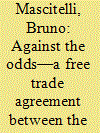

|
|
|
|
|
| Summary/Abstract |
The European Union (EU) and Australia have embarked officially on a free trade agreement (FTA) negotiation process, a procedure expected to last no less than 5 years. Public pronouncements from both sides which announced the beginning of the process of negotiating an FTA marked a significant departure from the well-known tensions and difficulties which date back to the late 1950s. British entry into the then European Economic Community in 1973 meant that it had to align its trade policies with the much contested European Common Agricultural Policy (CAP). This had been implemented in the late 1960s and provided limitless reasons for antagonism between Australia and the EU. Yet, over time, the trade agenda changed for both sides with new actors and new agreements, and some of the previous machinery no longer providing the liberalisation of trade as intended. Both the EU and Australia have moved on—some of this change due to new political actors and new economic realities. Despite the tortured history between them, and mindful that some might be sceptical about this change of heart, real politik often imposes its own political will and the new needs may well be in sharp contrast to the past relationships. The prospect of an FTA shows how the trappings of history might be side stepped by a stronger, almost opportunistic, sense of economic benefits however small they might appear.
|
|
|
|
|
|
|
|
|
|
|
|
|
|
|
|
| 2 |
ID:
162510
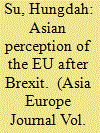

|
|
|
|
|
| Summary/Abstract |
The Brexit was in general interpreted as damage to the EU image abroad. In order to understand this damage and to propose some remedies for the EU public diplomacy in Asia, the authors conducted a media analysis of mainstream newspapers between May and October 2016 and a general survey between July 2016 and February 2017 in Taiwan. Based upon this analysis and survey, the authors intended to give a picture of EU image in Taiwanese media and people’s perception after the Brexit and find out key factors shaping this image. According to them, EU was frequently reported as a reference rather than a focus in Asian media, of which a majority of reports were neither positive nor negative. Brexit did increase visibility of the EU but in a very negative way. In order to remedy this damage and promote EU image in the aftermath of Brexit, the authors proposed two approaches after an in-depth study of all of those news reports and the general survey. It is suggested that EU should continue to strengthen its bilateral relationship with Asian countries and, at the same time, adopt normative actions on the world stage.
|
|
|
|
|
|
|
|
|
|
|
|
|
|
|
|
| 3 |
ID:
162506
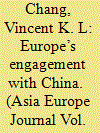

|
|
|
|
|
| Summary/Abstract |
This article discusses the dramatic recent shifts in Chinese policy perspectives on the European Union (EU) and on EU-China relations. Whereas for more than a decade, policy makers and Europe specialists in China had regarded the EU as an exemplar of regional integration and as a promising new ‘pole’ in the global order, a recent survey shows that today, in the wake of the Eurozone crisis, the refugee crisis, and the ‘Brexit’ referendum, many perceive the EU as a troubled actor unfit to deal with the existential challenges confronting it, let alone play a credible leadership role beyond its own borders. Despite this, Beijing’s ambitious international agenda at a time of increasing global uncertainty guarantees China’s ever-growing stake in building a reliable, long-term partnership with the EU, even though recent Chinese diplomatic and economic initiatives are gravitating toward the Union’s periphery, targeting subregional groupings of Member States along Europe’s re-emerging, traditional fault lines. Based on the research findings presented in this paper, the authors argue that the EU and the Member States need to rethink the basic assumptions underlying their China policies in the so-called ‘New Era’ and explore new approaches of engagement that match these shifting perceptions, policies and political realities.
|
|
|
|
|
|
|
|
|
|
|
|
|
|
|
|
| 4 |
ID:
162505
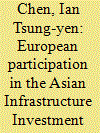

|
|
|
|
|
| Summary/Abstract |
This paper asks why half of the members of the European Union (EU) have chosen to join the China-led Asian Infrastructure Investment Bank (AIIB) in defiance of substantial pressure from Washington. If the AIIB is too good an economic opportunity for Europe to ignore, then why did the rest of the EU turn its back on this organization? To account for this apparent variation in the attitude of European countries, I argue that, ceteris paribus, changes in the strategic situation involving Europe, the USA, and China, as well as differing expectations of economic opportunities in a developing Asia, have led European countries in different directions. Those countries which are getting increasingly friendly with China, which results from increasing level of alliance security dilemma with the USA, and are highly dependent on the potentially gigantic Asian market are the most likely to follow China’s lead. Countries that are not so geared toward China or Asia are least likely to join the AIIB. Where only one of these factors is present, the country will remain hesitant. I test this argument using both quantitative and qualitative analysis. This includes probit analysis for 31 countries and three in-depth case studies involving Germany, Belgium, and Romania. These countries have a high, median, and low chance of joining the bank, respectively. The findings of both types of analysis support the proposed analytical framework.
|
|
|
|
|
|
|
|
|
|
|
|
|
|
|
|
| 5 |
ID:
162509
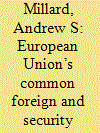

|
|
|
|
|
| Summary/Abstract |
The European Union (EU) is at a turning point. With the bipolar order of the Cold War fast becoming a distant memory, the European Union must quickly establish itself on the global stage before it loses the opportunity to do so. With Northeast Asia fast emerging as a new economic giant and political center for world affairs, the EU must reform its Common Foreign and Security Policy in order to develop a reputation and image as a global actor of soft power, based on its long-standing values and peaceful diplomacy. However, despite major reforms in the Lisbon Treaty (2009), the EU has not been able to form cohesion amongst its members, thus hindering its progress in achieving such international recognition. This paper therefore analyses the reforms taken place so far and suggests further reforms that will build a strong foundation for a united and cohesive foreign policy. It will then look at how the reformed framework will allow the EU to establish itself as a global actor in political affairs, in particular in Northeast Asia.
|
|
|
|
|
|
|
|
|
|
|
|
|
|
|
|
| 6 |
ID:
162512


|
|
|
|
|
| Summary/Abstract |
After more than 4 years of negotiations, Japan and the EU have reached an agreement for bilateral free trade. The intended liberalization of trade in goods, agriculture, and services would create the world’s largest free trade area. Japan and Europe are sending a strong signal against protectionism and in favor of free trade and modernizing global trade rules. While free trade in the transatlantic and the transpacific context will remain an illusion for some time to come, the Japan-EU Economic Partnership Agreement (JEEPA) is a realistic option for trade partners at the western and eastern side of the Eurasian continent. The expected overall positive effects of JEEPA should not obscure the limitations and risks of the intended trade integration. There will be economic losers of the agreement both in Europe and in Japan. There is plenty of fuel for political and social conflict. And in light of the many informal barriers, market access to Japan will remain extremely difficult for European companies. Beyond trade policy, JEEPA has a political dimension, too. It shows the political will to counteract economic disintegration and the loss of political substance in the bilateral relationship. The aim is to intensify cooperation, which would benefit both sides economically and politically.
|
|
|
|
|
|
|
|
|
|
|
|
|
|
|
|
| 7 |
ID:
162511


|
|
|
|
|
| Summary/Abstract |
This article examines how othering is an imperative element in the external policies of the European Union (EU) in its relationship with Singapore. From a post-structural perspective, we look at these policies as problem-constructing processes and consider othering as the production of knowledge on “the other”. We focus on civil society engagement in the Free Trade Agreement and cooperation in the tax area in the Partnership and Cooperation Agreement between the two countries. We find the EU to bring into reality a version of the country that interacts with these policies as problem producing.
|
|
|
|
|
|
|
|
|
|
|
|
|
|
|
|
| 8 |
ID:
162508
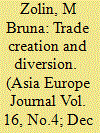

|
|
|
|
|
| Summary/Abstract |
Based on estimation of the gravity equation, this article aims to scrutinise the trade effects emanating from the economic integration of the European Union (EU) by focusing on the trade diversion and trade creation effects of the fifth EU enlargement on 12 groups of agricultural and food products. This paper analyses the changes due to the EU’s enlargement of trade patterns in the agricultural and food sectors among the EU member states and between EU and non-EU countries as well as the effects of the enlargement on exports of agricultural and food products from selected Asian countries to the EU market. Our analysis shows no decline in exports from EU to non-EU countries. Trade creation effects are significantly high for 4 product groups: seafood, woody plants, beverages and tobacco, and animal and vegetable materials. However, trade diversion effects are found in animal and vegetable oils and textile fibres. Moreover, the economic integration has had no significant effect on exports from Asian countries, namely agricultural and food products. The data of 38 countries cover the period 1999–2015.
|
|
|
|
|
|
|
|
|
|
|
|
|
|
|
|
|
|
|
|
|